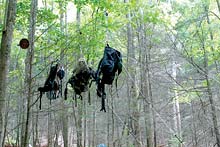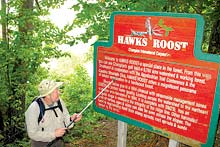You can’t hike with your dog in the Smokies. You can’t build a wood fire in the Shining Rock Wilderness. When you’re in DuPont State Forest, mountain bikes whiz past you. Why is each place so different and who makes the rules anyway?

In Western North Carolina, we’re blessed with an enormous amount of public land in our national parks and forests, state parks and forests and federal-wilderness areas. And while they may all seem alike on the surface, there are vast differences in the philosophy behind each place and the way it’s managed.
Our national parks
National parks, which in this region include the Great Smoky Mountains National Park, the Blue Ridge Parkway, the Appalachian Trail (more properly known as the Appalachian National Scenic Trail), and the Carl Sandburg Home National Historic Site, were created to preserve and restore land to wilderness, or, in the case of the last, maintain historic structures and sites. The National Park System Organic Act, which created the National Park Service, cites that the “fundamental purpose of the parks is … to provide for the enjoyment … in such manner and by such means as will leave them unimpaired for the enjoyment of future generations.”
To this end, certain rules apply in national parks. You can’t hunt in them, for instance, or gather plants or mountain bike on their trails. But beyond the rules, national parks focus on recreation. They have more extensive facilities, better maintained trails, and generally are more user-friendly than national forests. Their backcountry campsites even have bear poles to hang your pack on, so bears can’t get to your food.
Our forests
National forests, which are operated by the U.S. Forest Service under the Department of Agriculture, stress conservation. In practice, that means that hunting by permit is allowed, as well as logging by timber companies, road building, plant-gathering by permit, mountain-biking on hiking trails and even the use of ATVs.
Conservation, at its core, is the careful utilization of a natural resource in order to prevent depletion. Hugh Irwin, program director and conservation planner for the Southern Appalachian Forest Coalition, explains that National Forests have a different mission than the Parks. “Recreation is only one of several missions,” Irwin says. “The large number of uses tries to balance out each other
Ah, wilderness

And then we have wilderness areas, whose very names seem to evoke fear or awe. Wilderness may mean walking alone under a stand of trees untouched by a saw blade or along an unspoiled stream without seeing anyone else. Others picture wilderness as a place with savage animals where they’ll need to rub two sticks together to start a fire and survive somehow until they get rescued.
Shining Rock Wilderness doesn’t fit either picture. Rather, it’s a landscape that was ravaged over the centuries by logging, fire, and exotic insects, which has become one of the favorite hiking areas in the Southeast.
Each wilderness area is created by an act of Congress and comes with its own set of rules. Old roads are now gated. Logging is not permitted and only hand tools can be used to maintain the trails. It’s more difficult to saw a large blowdown with a handsaw than with a chainsaw. Trails aren’t blazed, which leads to a maze of “social trails,” pounded bare by hikers trying to find the real trail.
North Carolina lands
North Carolina has a structure of state parks and forests, both under the oversight of the North Carolina Department of Environmental and Natural Resources. Go up to Mount Mitchell State Park, surrounded by Pisgah National Forest land. In the state park, you can buy a snack, a book and even sit down for a restaurant meal. Trails are manicured and well-marked. As you follow them into the Pisgah National Forest, they become rugged, with few blazes.
Most state parks have operating hours and shut their gates after hours. The first time I stayed in Hanging Rock State Park, north of Winston-Salem, I almost freaked out. I’m locked in here? Because Mount Mitchell State Park is surrounded by a national forest, it’s an exception to the rule.
State parks tend to be very well-maintained. They don’t allow hunting and emphasize recreation of the softest kind. And unlike our neighboring states, North Carolina’s state parks don’t charge an entrance fee.
State forests are a mixed bag, preservation-wise. Dupont, between Hendersonville and Brevard, was saved from development only after much controversy. You don’t have to go far into the forest to see roads, buildings, even a half-built clubhouse.
Hunting and hiking
As I write this, we’re at the end of the first of two hunting seasons in Western North Carolina—the second begins December 10 and ends January 1. If you look at the hunting season calendar from the North Carolina Wildlife Resources Commission (www.ncwildlife.org), you’ll see that one can hunt something almost any time of the year. However, when people talk about hunting season, they’re usually referring to bear, boar or deer season, all of which occur between October and January 1.
In our area, you can’t hunt in national or state parks. Dupont State Forest has very restrictive rules on hunting. In addition, there’s no hunting on Sundays in North Carolina. So when hiking during hunting season, the Pisgah and Nantahala national forests are your main concern. Hunters and other outdoor enthusiasts can coexist. Wear a safety-orange hat or vest, stay on the trails and you probably won’t encounter any problems.
[Hike leader and outdoor writer Danny Bernstein is the author of Hiking the Carolina Mountains. She can be reached at danny@hikertohiker.com]



Before you comment
The comments section is here to provide a platform for civil dialogue on the issues we face together as a local community. Xpress is committed to offering this platform for all voices, but when the tone of the discussion gets nasty or strays off topic, we believe many people choose not to participate. Xpress editors are determined to moderate comments to ensure a constructive interchange is maintained. All comments judged not to be in keeping with the spirit of civil discourse will be removed and repeat violators will be banned. See here for our terms of service. Thank you for being part of this effort to promote respectful discussion.